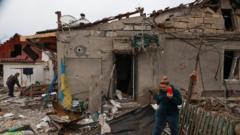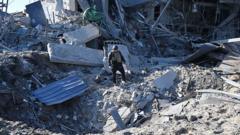Ukraine and Russia are engaged in a war of words over alleged violations of an "Easter truce," with President Zelensky accusing Russia of numerous attacks, while Russia refutes the claims, asserting their forces adhered to the ceasefire.
Accusations Fly as Ukraine and Russia Clash Over Easter Truce Violations

Accusations Fly as Ukraine and Russia Clash Over Easter Truce Violations
Both nations blame each other for breaking a recently announced ceasefire amidst ongoing conflict.
Ukraine and Russia are currently embroiled in a tense exchange regarding adherence to a recently proclaimed 30-hour "Easter truce," instigated by Russian President Vladimir Putin on Saturday. Ukrainian President Volodymyr Zelensky has reported that over 46 assaults from Russian forces have targeted Ukrainian positions since Sunday morning, although these figures remain unverified by independent sources.
In retaliation, Russia's defense ministry asserted it successfully countered Ukraine's alleged offensive actions, claiming that Kyiv had launched a multitude of drone strikes and artillery shells, as reported by state media. Putin had declared that hostilities would cease at 16:00 BST on Saturday and would resume at midnight local time on Sunday, a gesture intended to foster a temporary peace during the Easter holiday.
Despite the truce announcement, Zelensky dismissed it as a mere public relations effort by Russia, stating that Ukraine experienced hundreds of attacks and drone incursions during this period, reflecting the Kremlin's ongoing aggression. He emphasized that the root cause of the ongoing conflict lies with Russia, calling the truce declaration "empty" rhetoric.
The Russian defense ministry, however, maintained that their troops had fully complied with the ceasefire conditions, countering Ukraine's narrative of continued hostilities. This unexpected truce emerged shortly after U.S. President Donald Trump signaled a potential withdrawal from facilitating Russia-Ukraine peace talks, coinciding with Ukraine's willingness to extend the truce.
Reactions to the ceasefire have been mixed among civilians. In Kyiv, many expressed skepticism regarding Putin's commitment to peace, while in the Russian-occupied city of Donetsk, residents voiced doubts about Zelensky's sincerity in upholding the truce. "There were no assurances that we will not be shelled," stated a Donetsk resident, reflecting the pervasive distrust shared by many.
The conflict, which escalated dramatically following Russia's full-scale invasion of Ukraine on February 24, 2022, has resulted in significant casualties, predominantly among military personnel on all sides. Efforts from the U.S. to mediate a resolution have faced obstacles, with Moscow presenting stringent conditions to a possible ceasefire.
On the diplomatic front, U.S. Secretary of State Marco Rubio indicated a pressing need to evaluate the feasibility of peace talks, noting that prolonged negotiations were not sustainable given pressing national priorities. He implied that if meaningful dialogue does not emerge swiftly, the U.S. might reassess its involvement in discussions surrounding the conflict.





















